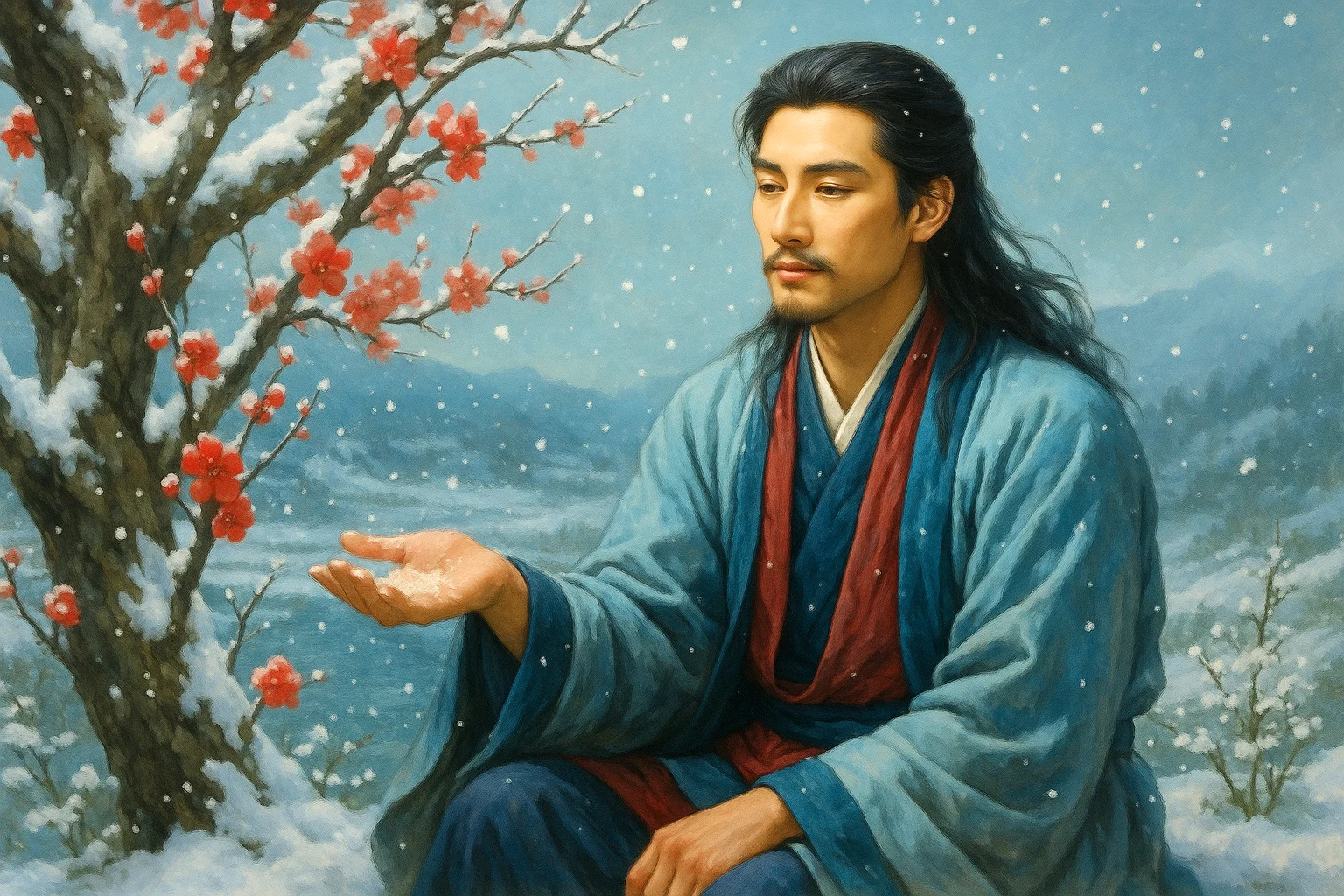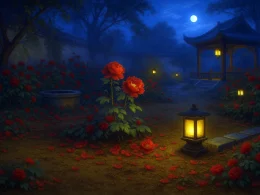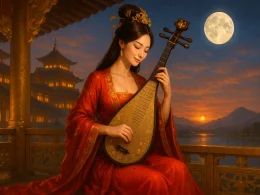Double oars stir water chestnut waves,
A straw cloak brushes through pine-kissed rain—
Dusk’s sorrow slowly fills the vast expanse.
I call to my gull allies:
They dip and soar as if to land,
Then glide past treetops, leaving me behind.
That time I returned alone,
My lone boat cut through clouds and snow,
Sailing into the night.
Now, heart heavy, I see again
Those faintly traced eyebrow peaks,
Their dark contours pressing low.
Along the Perfume-Gathering Path, spring chills linger.
An old man sways drunkenly,
Singing to himself—who answers?
Gazing west toward Hanging Rainbow Bridge,
I long to drift away with the wind—
This urge, lifelong, remains untamed.
Sobered, I find waves have carried the past afar.
Lost in thought, I see her still:
Jade hairpins, white silk socks...
Where is she now?
Only the railings remain,
Keeping me fleeting company.
Original Poem
「庆宫春 · 双桨莼波」
双桨莼波,一蓑松雨,暮愁渐满空阔。
呼我盟鸥,翩翩欲下,背人还过木末。
那回归去,荡云雪、孤舟夜发。
伤心重见,依约眉山,黛痕低压。采香径里春寒,老子婆娑,自歌谁答?
姜夔
垂虹西望,飘然引去,此兴平生难遏。
酒醒波远,正凝想、明挡素袜。
如今安在?惟有阑干,伴人一霎。
Interpretation
Composed in the winter of 1196 during Emperor Ningzong's reign, this ci poem was written when Jiang Kui passed Rainbow Bridge (垂虹桥) again while traveling from Fengyu to Liangxi by night. Five years prior, he had stopped here during a snowy homeward journey accompanied by Xiaohong, a maidservant gifted by his friend Fan Chengda, and commemorated the moment in verse. Now revisiting the site alone—Xiaohong gone, Fan deceased for three years—the poet channels his nostalgia for lost companions and vanished youth into this lyrical meditation on memory's fragility.
First Stanza: "双桨莼波,一蓑松雨,暮愁渐满空阔。"
Shuāng jiǎng chún bō, yī suō sōng yǔ, mù chóu jiàn mǎn kōng kuò.
Twin oars part water-lily streams,
A straw cloak wards off pine-needle rains—
Dusk-woven sorrow spreads through widening space.
The opening juxtaposes delicate natural imagery ("water-lily streams," "pine-needle rains") with expanding emptiness, crafting an atmosphere where beauty and melancholy intertwine.
"呼我盟鸥,翩翩欲下,背人还过木末。"
Hū wǒ méng ōu, piān piān yù xià, bèi rén hái guò mù mò.
I call my oath-bound gulls—they wheel,
Almost alight, then veer past treetops away.
The "oath-bound gulls" (盟鸥), traditional symbols of wilderness companionship, now reject his call, embodying broken bonds and the elusiveness of the past.
"那回归去,荡云雪、孤舟夜发。"
Nà huí guī qù, dàng yún xuě, gū zhōu yè fā.
That year we left:
Through clouds and snow our lone boat carved its trace.
Memory intrudes abruptly, transporting us to the snowy night departure five years prior—a fleeting glimpse of vanished warmth.
"伤心重见,依约眉山,黛痕低压。"
Shāng xīn chóng jiàn, yī yuē méi shān, dài hén dī yā.
Now heartbreak revisits:
Those eyebrow-mountains loom,
Their ink-wash curves pressing low.
The "eyebrow-mountains" (眉山) simultaneously describe the landscape and evoke absent loved ones—Xiaohong's brows, a Hefei lover's gaze—layering personal and geographical remembrance.
Second Stanza: "采香径里春寒,老子婆娑,自歌谁答?"
Cǎi xiāng jìng lǐ chūn hán, lǎo zi pó suō, zì gē shéi dá?
In Herb-Gathering Lane's spring chill,
This old man lingers, muttering verse—
Who responds now?
The poet's solitary singing highlights the absence of Xiaohong, who once harmonized with him, amplifying his isolation through negative space.
"垂虹西望,飘然引去,此兴平生难遏。"
Chuí hóng xī wàng, piāo rán yǐn qù, cǐ xìng píng shēng nán è.
Westward from Rainbow Bridge I gaze,
Then drift wherever whim conveys—
Such impulses no lifetime can restrain.
The sudden desire to roam freely contrasts with his physical and emotional entrapments, honoring Fan Chengda's free-spirited legacy.
"酒醒波远,正凝想、明珰素袜。"
Jiǔ xǐng bō yuǎn, zhèng níng xiǎng, míng dāng sù wà.
Sobering, I watch waves stretch far,
Conjuring one with jade earrings,
White-socked feet—
The allusion to "jade earrings and white socks" (明珰素袜) from "The Goddess of the Luo River" merges literary nostalgia with personal longing, blurring myth and memory.
"如今安在?惟有阑干,伴人一霎。"
Rú jīn ān zài? Wéi yǒu lán gān, bàn rén yī shà.
Where is she now?
Only the bridge's balustrade
Keeps brief vigil with me.
The closing lines—with their stark question and the balustrade's mute companionship—reduce five years of longing to a single, frozen moment, where architecture outlasts human connections.
Holistic Appreciation
This lyric masterfully interweaves personal melancholy, travelogues, and historical nostalgia, drawing upon natural landscapes like Lake Tai, the Rainbow Bridge, and the Incense-Gathering Path—along with ancient relics—to evoke remembrance of old companions, past journeys, and cherished confidantes. Though not a single word explicitly denotes "sorrow," an elegiac tone permeates every line; though no names are mentioned, vivid figures emerge distinctly. As Guo Lin remarked, it "sheds all ornamentation to reveal pure clarity, like a slender rock bearing a lone blossom, or the sound of a clear flute echoing from distant chimes." Here, emotion and scenery are inseparable, creating profound artistic conception and understated beauty.
Artistic Merits
- Temporal layering, past and present interlaced: The lyric blends reality and dreams, memory and immediacy, intertwining time and space to craft an immersive nostalgic atmosphere.
- Emotion veiled in scenery, projected onto objects: The "pledge-sharing gulls," "eyebrow-like mountains," and "railings" all serve as emotional conduits—subtle vessels for unspoken longing.
- Allusions refined yet effortless: "Jade earrings and white silk socks" borrow imagery from the Goddess of the Luo to embody yearning for a beauty, achieving classical elegance without stiffness.
- Linguistic sparseness with depth: Concise yet resonant, the diction balances austere grace with tender pathos.
- Ethereal imagery, painterly vignettes: The misty rain over Lake Tai, the shadows of soaring gulls, and distant ink-blue mountains compose a series of monochrome landscapes that transport the mind.
Insights
This lyric conveys a profound emotional resonance that transcends specific events or relationships. It reveals how beauty and loss in memory often entwine, and how revisiting the past may deepen sentiment through time’s alchemy. Life flows like a boat on water—whether old friends reunite or landscapes remain unchanged, those fleeting moments of connection and understanding become life’s true treasures. Amid worldly chaos, Jiang Kui’s poetic practice—channeling ideals through lyrics and emotions through scenery—offers a model of clarity and restraint, guiding us to see beyond the mundane and seek pathways to the soul.
About the poet

Jiang Kui (姜夔, c. 1155 - 1221), a native of Poyang, Jiangxi, was a Southern Song Dynasty lyric poet and musician. He remained a commoner throughout his life. His lyrics are known for their ethereal and austere style, and his poetry is also highly regarded. Along with Fan Chengda and Yang Wanli, he is celebrated as one of the "Four Great Masters of the Restoration."












